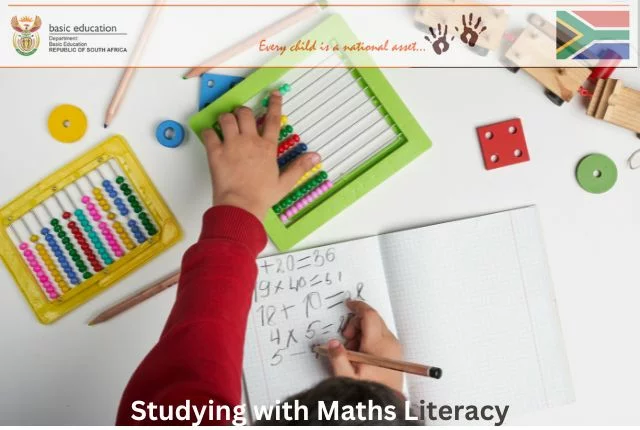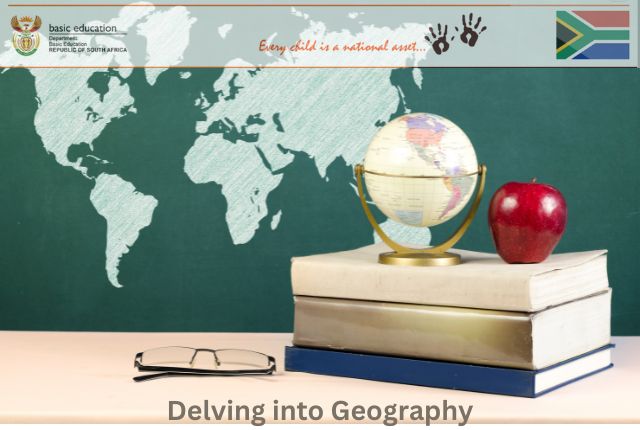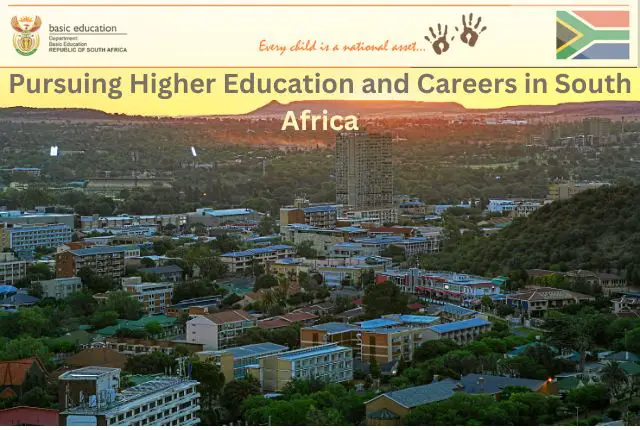The subjects you choose in high school can significantly impact your academic and career path. In this article, we will explore the study opportunities [8] available to students who have taken Maths Literacy, Life Science, and Geography. These subjects open doors to various fields and careers, and we will delve into the options students can pursue with these subject combinations.

STUDYING WITH MATHS LITERACY
Maths Literacy is designed to provide students with essential mathematical skills applicable to everyday life and various career fields. It differs from core Mathematics, which focuses on more advanced mathematical concepts and techniques. Let’s explore the fields and courses that students can pursue with Maths Literacy [7].
Popular Fields and Courses with Maths Literacy:
While Maths Literacy may not lead to careers in advanced mathematical fields or engineering, many fields value the practical mathematical skills it teaches. Some popular fields [9] and courses that can be pursued with Maths Literacy include:
- Social Sciences: Students with Maths Literacy can explore subjects like psychology, sociology, and anthropology. These fields require an understanding of statistics and data analysis, which can be obtained through Maths Literacy.
- Tourism and Hospitality Management: Maths Literacy can provide students with the necessary skills to manage budgets, calculate costs, and make financial decisions in tourism and hospitality settings.
- Education: Students interested in teaching primary or secondary education can pursue a teaching qualification with Maths Literacy. They can focus on subjects like Life Science, Geography, or even Maths Literacy itself.
- Business and Commerce: Many business-related courses, such as marketing, human resources, and entrepreneurship, can be pursued with Maths Literacy. These fields often require practical mathematical skills for budgeting, financial planning, and data analysis.
- Environmental Sciences: With a strong foundation in Maths Literacy, students can study environmental sciences, focusing on areas like environmental management and sustainability.
Students should research specific course requirements at their preferred institutions, as some programs may require core Mathematics or higher levels [1] of Maths Literacy.
EXPLORING OPPORTUNITIES WITH LIFE SCIENCE

Life Science [4] is the study of living organisms, their structures, functions, and interactions with the environment. This subject is vital in understanding the world around us and opens up various career paths and courses for students.
Career Paths and Courses with Life Science:
Life Science is a versatile subject that can lead to numerous exciting opportunities [10]. Some popular fields and courses related to Life Science include:
- Biological Sciences: Students with a background in Life Science can study biology, microbiology, or molecular biology. These fields focus on the study of living organisms and can lead to careers in research, pharmaceuticals, or biotechnology.
- Health Sciences: Life Science can be a stepping stone to various health-related fields, including nursing, nutrition, and occupational therapy. While some programs may require core Mathematics, there are institutions in South Africa where students can study nursing with Maths Literacy.
- Agriculture and Animal Sciences: Life Science can open doors to careers in agriculture, horticulture, or animal sciences, focusing on areas such as crop production, animal husbandry, and sustainable farming practices.
- Conservation and Wildlife Management: Students with a passion for nature and wildlife can study conservation and wildlife management, working to protect and preserve natural habitats and ecosystems.
Students should check the specific subject requirements for their chosen courses, as some programs may have additional prerequisites or recommended subjects.
DELVING INTO GEOGRAPHY
According to National Geographic [2], geography is the study of Earth’s landscapes, peoples, places, and environments. This subject helps students understand the complex relationships between humans and their environments, leading to various career paths and study opportunities.

Potential Courses and Career Paths in Geography:
Geography is a diverse field that can lead to numerous study opportunities and careers (Rosenberg, Matt) [5]. Some popular courses and career paths related to Geography include:
- Urban and Regional Planning: Students with a background in Geography can pursue a career in urban and regional planning, working to develop sustainable and functional communities.
- Environmental Management: Geography can be an excellent foundation for studying environmental management, focusing on the conservation and sustainable use of natural resources.
- Geomatics and Cartography: Geomatics and cartography involve the collection, analysis, and interpretation of geographical data. Students can pursue careers in surveying, mapping, and geographic information systems (GIS).
- Climatology and Meteorology: Geography can lead to careers in climatology and meteorology, where students study and predict weather patterns and climate change.
Again, students should verify specific subject requirements for their chosen programs, as additional prerequisites or recommended subjects may apply.
COMBINING MATHS LITERACY, LIFE SCIENCE, AND GEOGRAPHY
These three subjects can open doors to interdisciplinary studies and career paths. Students with a combination of Maths Literacy, Life Science, and Geography can explore various opportunities where these subjects intersect [6].
Courses and Programs Involving Maths Literacy, Life Science, and Geography
Some examples of courses and programs that involve these subjects include:
- Environmental Health: This field focuses on assessing and managing the impact of human activities on the environment and public health. Students with a background in Maths Literacy, Life Science, and Geography can study environmental health to work in areas like pollution control, waste management, and public health policy.
- Sustainable Development: Students interested in sustainability and the environment can pursue courses in sustainable development, combining knowledge from Maths Literacy, Life Science, and Geography to develop strategies for responsible growth and resource use.
- Disaster Management: With a foundation in these subjects, students can study disaster management to understand and mitigate the impacts of natural and human-made disasters on communities and the environment.
By combining their knowledge from Maths Literacy, Life Science, and Geography, students can develop a unique skill set that makes them valuable assets in various interdisciplinary fields.
PURSUING HIGHER EDUCATION AND CAREERS IN SOUTH AFRICA
In the South African context, students with Maths Literacy, Life Science, and Geography have numerous opportunities to pursue higher education and careers. Some questions related to studying in South Africa have been addressed earlier in the article. However, let’s delve into the role of these subjects in the South African context.

Fields of Study and Opportunities in South Africa:
South Africa offers a diverse range of study programs and career opportunities for students with Maths Literacy, Life Science, and Geography. Some fields and institutions to consider include:
- Universities: Various universities in South Africa offer programs that accept students with Maths Literacy, Life Science, and Geography. Students should research the admission requirements for their preferred institutions and courses, as some programs may require core Mathematics or higher levels of Maths Literacy.
- University of Technology: Institutions like the Cape Peninsula University of Technology (CPUT) offer diplomas and degrees in fields like environmental management, tourism, and business administration. These programs often accept students with Maths Literacy.
- Technical Vocational Education and Training (TVET) Colleges: TVET colleges in South Africa provide practical training in fields like agriculture, conservation, and business management, where Maths Literacy, Life Science, and Geography are valuable.
Students should consult with career guidance counselors or academic advisors to explore the most suitable options based on their interests and subject choices.
TIPS FOR SUCCESS AND FURTHER STUDY
To succeed in their chosen fields, students must develop strong study habits and a solid foundation in their chosen subjects [3]. Here are some tips for success in Maths Literacy and Life Science:
How to Pass Maths Literacy in Grade 12:
To excel in Maths Literacy, students should:
- Practice regularly: Consistent practice is essential for mastering mathematical concepts and techniques. Students should work through exercises, past papers, and sample questions to improve their problem-solving skills.
- Understand the concepts: Focus on understanding the underlying concepts and their real-world applications. This will make it easier to tackle unfamiliar problems.
- Seek help when needed: Students should not hesitate to ask teachers, tutors, or peers for assistance if they struggle with a particular topic or concept.
- Stay organized and manage time: Create a study schedule and allocate sufficient time for each topic. This will help students cover all the material and avoid last-minute cramming.
How to Study for Life Sciences Effectively
To succeed in Life Sciences, students should:
- Create a study plan: Break down the syllabus into manageable sections and create a study schedule to cover all the material systematically.
- Use visuals and diagrams: Life Sciences often involve complex concepts and processes. Using visuals and diagrams can help students understand and remember information more easily.
- Make connections: Relate new information to what you already know or find real-life examples to help make the material more relevant and engaging.
- Test yourself: Regularly quiz yourself on the material to reinforce your understanding and identify any areas where you may need additional study.
CONCLUSION
Students with Maths Literacy, Life Science, and Geography have a wealth of study opportunities and career paths available to them. By exploring their interests and making informed decisions about their academic and career path, they can unlock their full potential and contribute to a better future for themselves and their communities.
References:
[1] “Career Fields You Can Pursue with Math Literacy Subject in South Africa.” My Courses, 20 May 2021, https://mycourses.co.za/careers-you-can-pursue-with-math-literacy-subject-in-south-africa/.
[2] “Geography.” Nationalgeographic.org, https://education.nationalgeographic.org/resource/geography-article. Accessed 12 Apr. 2023.
[3] Mathematical Literacy. “Career Field School Subjects Career Examples.” Sci-Bono.Co.Za, http://www.sci-bono.co.za/assets/5.-subjects-linked-to-career-areas-2-.pdf. Accessed 12 Apr. 2023.
[4] “No Title.” Study.com, https://study.com/learn/lesson/life-sciences-overview-topics-examples.html. Accessed 12 Apr. 2023.
[5] Rosenberg, Matt. “4 Reasons You Should Study Geography.” ThoughtCo, 5 Feb. 2010, https://www.thoughtco.com/why-study-geography-1435605.
[6] “What Can I Study with Maths Literacy and Life Science?” Whatcanistudy.Co.Za, https://whatcanistudy.co.za/what-can-i-study-with-maths-literacy-and-life-science/. Accessed 12 Apr. 2023.
[7] “What You Need to Know about Maths Literacy.” Trinityhouse.Co.Za, 29 Aug. 2022, https://www.trinityhouse.co.za/blog/what-you-need-to-know-about-maths-literacy.
[8] Cput.Ac.Za, https://www.cput.ac.za/storage/study_at_cput/prospectus_and_handbook/CPUT_PROSPECTUS__2019.pdf. Accessed 12 Apr. 2023.
[9] Careersportal.Co.Za, https://www.careersportal.co.za/high-school/what-can-i-become-with-maths-literacy. Accessed 12 Apr. 2023.
[10] Indeed.com, https://www.indeed.com/career-advice/finding-a-job/life-science-careers. Accessed 12 Apr. 2023.






